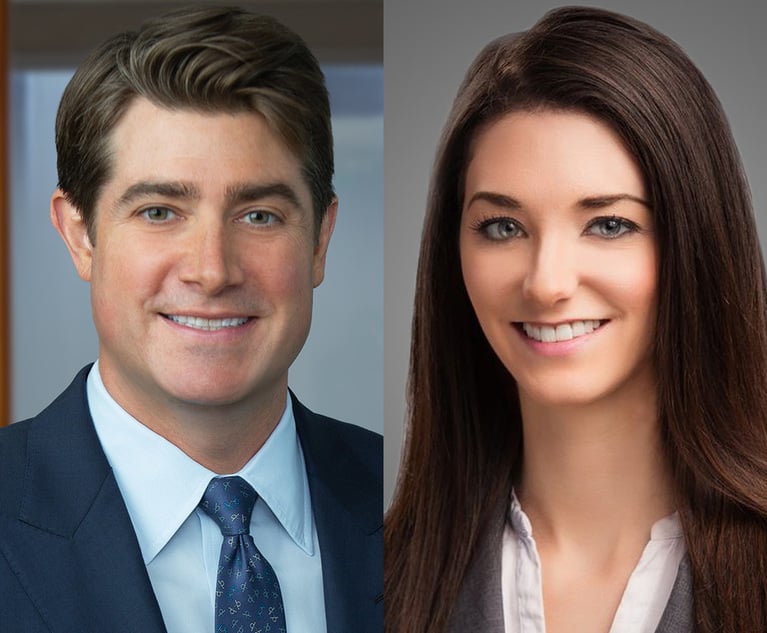Changes Looming for Pretrial Practice in Texas as Bills Pass State Senate Committee
“There are abuses that have arisen,” said Sen. Bryan Hughes, R-Tyler, the Senate sponsor of HB 2730.
May 13, 2019 at 05:16 PM
4 minute read
 Race against time. Wan Wei/Shutterstock.com
Race against time. Wan Wei/Shutterstock.com
Pretrial motion practice in Texas state courts is one step closer to drastic change after the Senate State Affairs Committee unanimously passed two pieces of legislation Monday.
Two separate motions to dismiss are getting tweaked in House Bills 2730 and 3300, which both overwhelmingly passed the Texas House and are on their way to Senate passage now that they have cleared the Senate committee process. Before they become law, the Senate must pass both bills by May 22, its deadline to consider all bills on second or third reading, and the governor must sign the bills. If this happens, the changes would take effect Sept. 1.
House Bill 2730 would narrow the Texas Citizens Participation Act, the state's anti-SLAPP law, which lawyers have used since 2011 to dismiss a wide range of case types and win attorney fees for their clients.
But the legislation would narrow the scope by limiting the anti-SLAPP law to legal actions dealing with free speech, free association and freedom to petition the government. Lawmakers meant for the law to apply only to First Amendment cases when it first passed in 2011, but the statute's broad language allowed lawyers to use it in cases in which the legislature never intended.
“There are abuses that have arisen,” said Sen. Bryan Hughes, R-Tyler, the Senate sponsor of HB 2730.
HB 2730 adds a long list of case types that are exempted from the anti-SLAPP law, and the exemptions include State Bar of Texas attorney discipline matters.
At Monday's Senate hearing, one attorney spoke out about the idea of excluding lawyer discipline cases. Rich Robins, attorney and editor of TexasBarSunset.com, said he thinks the bar pursues “bogus” grievances against attorneys to silence their opposition, and those lawyers should be able to file anti-SLAPP motions to dismiss.
Austin solo practitioner Mary Louise Serafine added that the current law is working, and the list of exemptions is a bad idea.
“This bill is like putting duct tape and staples on something that is already working,” she said.
But just as lawmakers might take away the anti-SLAPP motion to dismiss from many lawyers, a second bill, House Bill 3300, could broaden the appeal of another type of motion to dismiss.
Under current law, this motion, known as the “91a motion to dismiss” because it's located in Texas Rules of Civil Procedure Rule 91a, allows attorneys to argue for the dismissal of a case that has no basis in law or fact. There's a mandatory loser-pays provision that says the prevailing party collects attorney fees from the losing party.
The proposed HB 3300 would make a small but significant tweak to the law. In the loser-pays provision, it would change the word “shall” to “may,” which gives a judge discretion to decide to award fees.
Sen. Joan Huffman, R-Houston, the Senate sponsor of HB 3300, said that making fees discretionary would encourage the use of the motion to dismiss and help cut court backlogs.
Richard Trabulsi Jr., president of Texans for Lawsuit Reform, said at the hearing that HB 3300 would make this motion to dismiss more useful in Texas, because mandatory fee-shifting lessened the use of the motion.
“If you are a defendant, you have to put your own client at risk of losing the motion and paying the other side's attorney fees,” Trabulsi said. “If you are judge and grant a motion to dismiss, you may find it unjust to award attorney fees against a losing party who really can't afford the fees. You may not rule on the motion to dismiss or you may rule against.”
This content has been archived. It is available through our partners, LexisNexis® and Bloomberg Law.
To view this content, please continue to their sites.
Not a Lexis Subscriber?
Subscribe Now
Not a Bloomberg Law Subscriber?
Subscribe Now
NOT FOR REPRINT
© 2025 ALM Global, LLC, All Rights Reserved. Request academic re-use from www.copyright.com. All other uses, submit a request to [email protected]. For more information visit Asset & Logo Licensing.
You Might Like
View All
Big Law Firms Sheppard Mullin, Morgan Lewis and Baker Botts Add Partners in Houston
5 minute read
What Happens When Lateral Partners’ Guaranteed Compensation Ends?

Houston-Based Law Firm Overcomes Defamation Suit for Website Warning
3 minute readTrending Stories
- 1Data Breaches in UK Legal Sector Surge, According to ICO Data
- 2PayPal Faces New Round of Claims; This Time Alleging Its 'Honey' Browser Extension Cheated Consumers
- 3Fired NLRB Member Seeks Reinstatement, Challenges President's Removal Power
- 4NY Inspector General Announces Attorneys Hired to Lead Upstate Region and Gaming
- 5Carol-Lisa Phillips to Rise to Broward Chief Judge as Jack Tuter Weighs Next Move
Who Got The Work
J. Brugh Lower of Gibbons has entered an appearance for industrial equipment supplier Devco Corporation in a pending trademark infringement lawsuit. The suit, accusing the defendant of selling knock-off Graco products, was filed Dec. 18 in New Jersey District Court by Rivkin Radler on behalf of Graco Inc. and Graco Minnesota. The case, assigned to U.S. District Judge Zahid N. Quraishi, is 3:24-cv-11294, Graco Inc. et al v. Devco Corporation.
Who Got The Work
Rebecca Maller-Stein and Kent A. Yalowitz of Arnold & Porter Kaye Scholer have entered their appearances for Hanaco Venture Capital and its executives, Lior Prosor and David Frankel, in a pending securities lawsuit. The action, filed on Dec. 24 in New York Southern District Court by Zell, Aron & Co. on behalf of Goldeneye Advisors, accuses the defendants of negligently and fraudulently managing the plaintiff's $1 million investment. The case, assigned to U.S. District Judge Vernon S. Broderick, is 1:24-cv-09918, Goldeneye Advisors, LLC v. Hanaco Venture Capital, Ltd. et al.
Who Got The Work
Attorneys from A&O Shearman has stepped in as defense counsel for Toronto-Dominion Bank and other defendants in a pending securities class action. The suit, filed Dec. 11 in New York Southern District Court by Bleichmar Fonti & Auld, accuses the defendants of concealing the bank's 'pervasive' deficiencies in regards to its compliance with the Bank Secrecy Act and the quality of its anti-money laundering controls. The case, assigned to U.S. District Judge Arun Subramanian, is 1:24-cv-09445, Gonzalez v. The Toronto-Dominion Bank et al.
Who Got The Work
Crown Castle International, a Pennsylvania company providing shared communications infrastructure, has turned to Luke D. Wolf of Gordon Rees Scully Mansukhani to fend off a pending breach-of-contract lawsuit. The court action, filed Nov. 25 in Michigan Eastern District Court by Hooper Hathaway PC on behalf of The Town Residences LLC, accuses Crown Castle of failing to transfer approximately $30,000 in utility payments from T-Mobile in breach of a roof-top lease and assignment agreement. The case, assigned to U.S. District Judge Susan K. Declercq, is 2:24-cv-13131, The Town Residences LLC v. T-Mobile US, Inc. et al.
Who Got The Work
Wilfred P. Coronato and Daniel M. Schwartz of McCarter & English have stepped in as defense counsel to Electrolux Home Products Inc. in a pending product liability lawsuit. The court action, filed Nov. 26 in New York Eastern District Court by Poulos Lopiccolo PC and Nagel Rice LLP on behalf of David Stern, alleges that the defendant's refrigerators’ drawers and shelving repeatedly break and fall apart within months after purchase. The case, assigned to U.S. District Judge Joan M. Azrack, is 2:24-cv-08204, Stern v. Electrolux Home Products, Inc.
Featured Firms
Law Offices of Gary Martin Hays & Associates, P.C.
(470) 294-1674
Law Offices of Mark E. Salomone
(857) 444-6468
Smith & Hassler
(713) 739-1250







